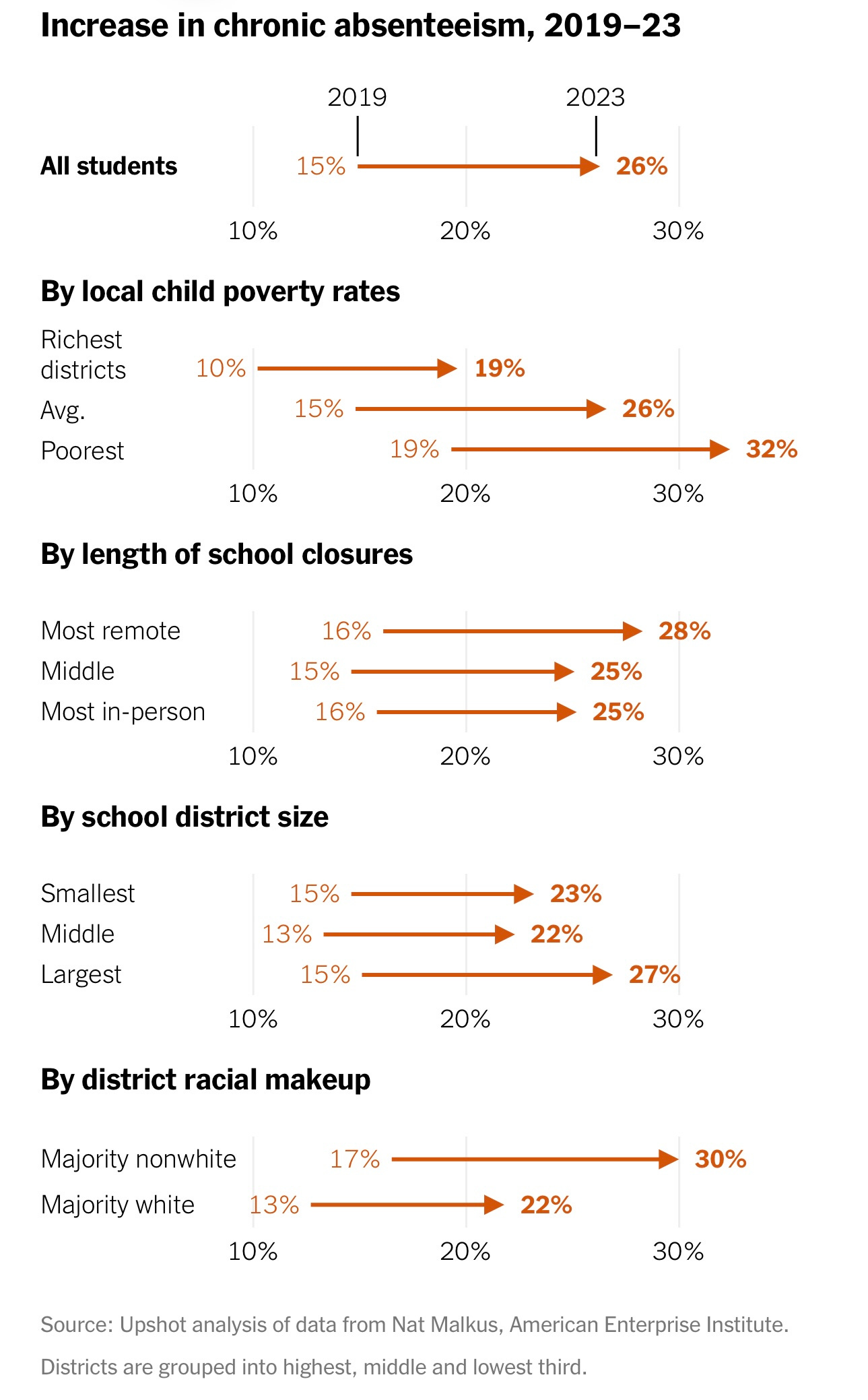FLASH SBF gets 25y for crypto scam
1 AI will transform healthcare but its deployment may be slow
2 Americans across party lines have soured on Israel’s war
3 School absenteeism has surged nationwide since the pandemic
4 American-led Red Sea bombing campaign not working
5 Russia big winner as cargo rerouted due to Red Sea crisis
3/29/1973 The last U.S. troops withdraw from South Vietnam
see ad astra on x @greg_loving
1 AI will transform healthcare but its deployment may be slow
Better diagnoses. Personalised support for patients. Faster drug discovery. Greater efficiency. Artificial intelligence (ai) is generating excitement and hyperbole everywhere, but in the field of health care it has the potential to be transformational. In Europe analysts predict that deploying ai could save hundreds of thousands of lives each year; in America, they say, it could also save money, shaving $200bn-360bn from overall annual medical spending, now $4.5trn a year (or 17% of gdp). From smart stethoscopes and robot surgeons to the analysis of large data sets or the ability to chat to a medical ai with a human face, opportunities abound. There is already evidence that ai systems can enhance diagnostic accuracy and disease tracking, improve the prediction of patients’ outcomes and suggest better treatments. It can also boost efficiency in hospitals and surgeries by taking on tasks such as medical transcription and monitoring patients, and by streamlining administration. It may already be speeding the time it takes for new drugs to reach clinical trials. New tools, including generative ai, could supercharge these abilities. Yet…although ai has been used in health care for many years, integration has been slow and the results have often been mediocre.
2 Americans across party lines have soured on Israel’s war
After narrowly backing Israel’s military action in Gaza in November, Americans now oppose the campaign by a solid margin. Fifty-five percent currently disapprove of Israel’s actions, while 36% approve.
Seventy-four percent of U.S. adults say they are following news of the Israeli-Hamas situation closely, similar to the 72% Gallup measured in November. One-third of Americans (34%) say they are following the situation “very closely.” Disapproval of Israel’s military action is similar regardless of how much attention Americans are paying to the conflict. However, those paying less attention are more likely than their counterparts to have no opinion on the matter, resulting in lower approval than seen among people paying greater attention.
All three major party groups in the U.S. have become less supportive of Israel’s actions in Gaza than they were in November. This includes declines of 18 percentage points in approval among both Democrats and independents and a seven-point decline among Republicans. Independents have shifted from being divided in their views of the Israeli military action to opposing it. Democrats, who were already largely opposed in November, are even more so now, with 18% approving and 75% disapproving. Republicans still support Israel’s military efforts, but a reduced majority -- 64%, down from 71% -- now approve.
3 School absenteeism has surged nationwide since the pandemic
In Anchorage, affluent families set off on ski trips and other lengthy vacations, with the assumption that their children can keep up with schoolwork online. In a working-class pocket of Michigan, school administrators have tried almost everything, including pajama day, to boost student attendance. And across the country, students with heightened anxiety are opting to stay home rather than face the classroom. In the four years since the pandemic closed schools, U.S. education has struggled to recover on a number of fronts, from learning loss, to enrollment, to student behavior. But perhaps no issue has been as stubborn and pervasive as a sharp increase in student absenteeism, a problem that cuts across demographics and has continued long after schools reopened. Nationally, an estimated 26 percent of public school students were considered chronically absent last school year, up from 15 percent before the pandemic, according to the most recent data, from 40 states and Washington, D.C., compiled by the conservative-leaning American Enterprise Institute. Chronic absence is typically defined as missing at least 10 percent of the school year, or about 18 days, for any reason.
The trends suggest that something fundamental has shifted in American childhood and the culture of school, in ways that may be long lasting. What was once a deeply ingrained habit — wake up, catch the bus, report to class — is now something far more tenuous. “Our relationship with school became optional,” said Katie Rosanbalm, a psychologist and associate research professor with the Center of Child and Family Policy at Duke University. The habit of daily attendance — and many families’ trust — was severed when schools shuttered in spring 2020. Even after schools reopened, things hardly snapped back to normal. Districts offered remote options, required Covid-19 quarantines and relaxed policies around attendance and grading.
4 American-led Red Sea bombing campaign not working
The gray F/A-18 fighter jets hurtled one by one from the deck of the USS Dwight D. Eisenhower into the heat of the Red Sea morning, scrambling to counter the latest attack drone launched by the Houthis. The $56 million aircraft were part of a coalition operation that nullified the attack, returning hours later as they have almost daily for the last several months. Yet for all the costly hardware the US and its allies have thrown at the Islamist group from northwest Yemen, they haven’t been able to stop the attacks on civilian freighters and warships. As a result, the world’s biggest shipping companies are still largely avoiding a route that once carried 15% of global commerce.
The Houthi campaign, which claimed its first civilian ship sunk in early March and its first fatalities not long after, is also a growing threat to the global economy. The number of vessels sailing through the southern Red Sea is down about 70% compared with the start of December. Container shipping has dropped about 90% and gas tankers have also all but ceased transit. Sailing around southern Africa adds about two weeks to the voyage. As a result, the cost of sending a container from Shanghai to Rotterdam is about double the level of a year earlier, according to Drewry Shipping.
5 Russia big winner as Asia—Europe cargo rerouted due to Red Sea crisis
Demand to move goods from Asia to Europe by rail via Russia has soared since the start of the Red Sea crisis, according to logistics companies and rail operators, boosting the finances of the country’s state-owned rail monopoly. Germany’s DHL said requests to transport goods on the Russian rail corridor had jumped about 40 per cent since container ships started diverting via a longer route in December. RailGate Europe said demand was up 25 to 35 per cent, while Netherlands-based Rail Bridge Cargo said cargo rail traffic via Russia this year was 31 per cent higher compared with the same time last year. Logistics companies have looked anew at routes through Russia following the decision of most large container shipping lines to divert Asia to Europe sailings that would normally go through the Suez Canal to travel via the Cape of Good Hope. They acted after a campaign of attacks on commercial ships was launched by Yemen’s Iran-backed Houthis in support of Gaza’s Palestinians.
3/29/1973 The last U.S. troops withdraw from South Vietnam
Thanks for reading!







